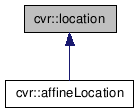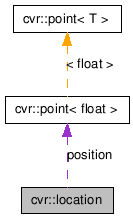

|
last update 20 Sep 2009 |
|
#include <cvrLocation.h>


Public Member Functions | |
| location () | |
| location (const ipoint &pos, const float &ang, const float &rad) | |
| location (const fpoint &pos, const float &ang, const float &rad) | |
| location (const location &other) | |
| location & | copy (const location &other) |
| location & | operator= (const location &other) |
| bool | operator== (const location &p) const |
| bool | operator!= (const location &p) const |
| bool | operator< (const location &other) |
| bool | operator> (const location &other) |
| location & | scale (const float &factor) |
| location & | scale (const location &other, const float &factor) |
| location & | shift (const ipoint &shft) |
| location & | shift (const fpoint &shft) |
| location & | shift (const location &other, const ipoint &shft) |
| location & | shift (const location &other, const fpoint &shft) |
| location & | rotate (const float &ang) |
| location & | rotate (const location &other, const float &ang) |
| bool | contains (const ipoint &p) const |
| bool | contains (const fpoint &p) const |
| float | distance (const location &other) |
Public Attributes | |
| fpoint | position |
| float | angle |
| float | radius |
It is mainly used in the extraction of local descriptors. There are some functors to extract the important or salient locations in an image, for example cvr::pyramidLocationSearch.
A locations is represented by its position in an image or channel, an orientation and a radius.
| cvr::location::location | ( | ) |
default constructor
| cvr::location::location | ( | const ipoint & | pos, | |
| const float & | ang, | |||
| const float & | rad | |||
| ) |
| cvr::location::location | ( | const fpoint & | pos, | |
| const float & | ang, | |||
| const float & | rad | |||
| ) |
| cvr::location::location | ( | const location & | other | ) |
copy constructor
| bool cvr::location::contains | ( | const fpoint & | p | ) | const |
| bool cvr::location::contains | ( | const ipoint & | p | ) | const |
| float cvr::location::distance | ( | const location & | other | ) |
returns the distance between the borders of two locations or zero if they overlap or one of the locations lies inside the other one.
| bool cvr::location::operator!= | ( | const location & | p | ) | const |
operator !=
| bool cvr::location::operator< | ( | const location & | other | ) |
Comparison operator: less than.
A location is smaller than another one if its radius is smaller, or in case of equal radii, if the position is smaller, i.e. if it has smaller y-coordinate, or in case of equal y-position, if it has smaller x-coordinate.
| bool cvr::location::operator== | ( | const location & | p | ) | const |
operator ==
| bool cvr::location::operator> | ( | const location & | other | ) |
Comparison operator: greater than.
A location is greater than another one if its radius is greater, or in case of equal radii, if the position is greater, i.e. if it has greater y-coordinate, or in case of equal y-position, if it has greater x-coordinate.
| location& cvr::location::rotate | ( | const float & | ang | ) |
Rotate the location by adding the given angle in radians to the actual angle.
| ang | rotation angle |
Multiply the other location's radius and position with the given factor and leave the result here.
| other | location to be scaled | |
| factor | scaling factor for radius and position. |
| location& cvr::location::scale | ( | const float & | factor | ) |
Multiply the radius and position with the given factor.
| factor | scaling factor for radius and position. |
| float cvr::location::angle |
Position of the location.
| float cvr::location::radius |
Radius or size of the location.